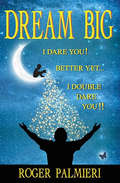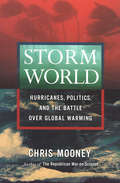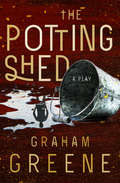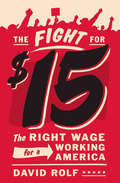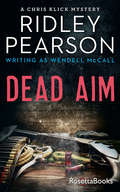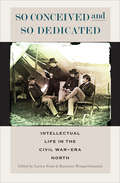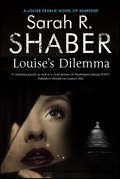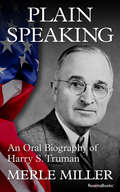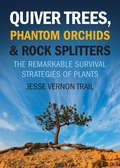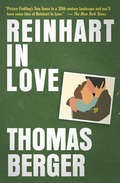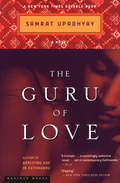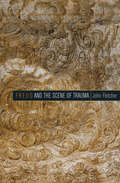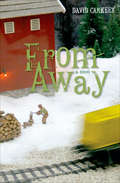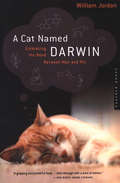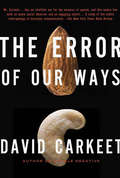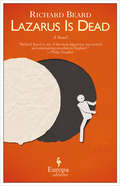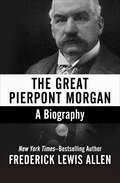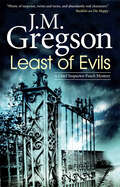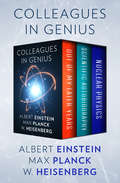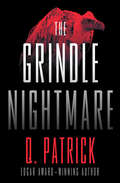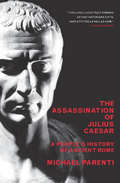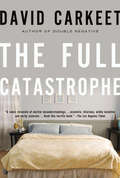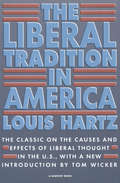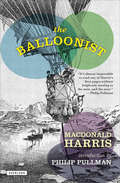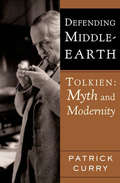- Table View
- List View
Dream Big: I Dare You! Better Yet . . . I Double Dare You!!
by Roger PalmieriAlign your actions to meet your goals and find success and self-fulfillment—from the sought-after speaker, coach, and Mind-Set Performance expert. By combining compelling prose, thought-provoking quotes, and real-life stories with grounding exercises, Dream Big: I Dare You! Better Yet . . . I Double Dare You!! informs, entertains, and persuades its readers to take their dreams seriously. Designed as an inspiring and practical guide book, the exercises turn insights into actionable steps that enhance results. Since 1978, Roger has fine-tuned and applied his Dream Big philosophy throughout his broad speaking, training, and coaching platform. His strong, highly experienced, common sense voice has encouraged thousands of people to live life fully, to achieve success, and to contribute significantly to others. Dream Big: I Dare You! Better Yet . . . I Double Dare You!! hands the frustrated dreamer a toolbox to take them from wishing and hoping to finally having their big dream become real.
Storm World: Hurricanes, Politics, and the Battle Over Global Warming
by Chris MooneyAn investigation into climate change and increasingly dangerous hurricanes from the New York Times–bestselling author of The Republican War on Science. A leading science journalist delves into a red-hot debate in meteorology: whether the increasing ferocity of hurricanes is connected to global warming. In the wake of Katrina, Chris Mooney follows the careers of leading scientists on either side of the argument through the 2006 hurricane season, tracing how the media, special interests, politics, and the weather itself have skewed and amplified what was already a fraught scientific debate. As Mooney puts it: &“Scientists, like hurricanes, do extraordinary things at high wind speeds.&” Mooney—a New Orleans native, host of the Point of Inquiry podcast, and author of The Republican Brain—has written &“a well-researched, nuanced book&” that closely examines whether we as a society should be held responsible for making hurricanes even bigger monsters than they already are (The New York Times). &“Mooney serves his readers as both an empiricist who gathers data and an analyst who puts it into context. The result is an important book, whose author succeeds admirably in both his roles.&” —The Plain Dealer &“Engaging and readable . . . Mooney catches real science in the act and, in so doing, weaves a story as intriguing as it is important.&” —Los Angeles Times Book Review &“Mooney has hit upon an important and controversial topic, and attacks it with vigor.&” —The Boston Globe &“An absorbing, informed account of the politics behind a pressing contemporary controversy.&” —Kirkus Reviews
The Potting Shed: A Play
by Graham GreeneFrom the British novelist, this Tony Award–winning drama of family secrets delivers &“brilliantly effective . . . enormously provocative . . . theatrical suspense&” (New York Post). The Callifer family has assembled in the English country home of Wild Grove where its patriarch—a once-renowned rationalist and man of letters—nears death. Arriving unexpectedly to pay his respects is his son, James, a pariah among the Callifers, who finds a dark veil still drawn over his mysterious childhood. It was decades ago, when James was fourteen, that something happened to him in the garden shed, a black hole in his memories. For everyone else, it&’s an unforgettable source of unease—and for some, unforgiveable. To discover the truth, James seeks out his ostracized uncle, an alcoholic priest with nothing left to lose. What unfolds makes for &“some of the most moving, forceful and compelling theatre since Eugene O&’Neill&” (The Harvard Crimson). Graham Greene&’s Tony Award–winning work for the stage made its Broadway debut in 1957 and was hailed by the New York Times as &“an original drama that probes deep into the spirit and casts a spell.&”
The Fight for $15: The Right Wage for a Working America
by David Rolf&“Rolf shows that raising the minimum wage to $15 is both just and necessary, lest the American dream of middle class prosperity turn into a nightmare&” (David Cay Johnston, Pulitzer Prize–winning journalist). Combining history, economics, and commonsense political wisdom, The Fight for $15 makes a deeply informed case for a national fifteen-dollars-an-hour minimum wage as the only practical solution to reversing America&’s decades-long slide toward becoming a low-wage nation. Drawing both on new scholarship and on his extensive practical experiences organizing workers and grappling with inequality across the United States, David Rolf, president of SEIU 775—which waged the successful Seattle campaign for a fifteen dollar minimum wage—offers an accessible explanation of &“middle out&” economics, an emerging popular economic theory that suggests that the origins of prosperity in capitalist economies lie with workers and consumers, not investors and employers. A blueprint for a different and hopeful American future, The Fight for $15 offers concrete tools, ideas, and inspiration for anyone interested in real change in our lifetimes. &“The author&’s plainspoken approach and stellar scholarship illuminate in-depth discussions about the deliberate policy decisions that began to decimate the middle class at the start of the 1980s as well as the insidious new ways in which big business continues to attack American workers today via stagnant wages, rampant subcontracting, unpredictable scheduling, and other detrimental practices associated with the so-called &‘share economy.&’&” —Kirkus Reviews &“David Rolf has become the most successful advocate for raising wages in the twenty-first century.&” —Andy Stern, senior fellow at Columbia University&’s Richard Paul Richman Center for Business, Law, and Public Policy
Dead Aim (The Chris Klick Mysteries #1)
by Ridley PearsonThe &“remarkable&” first novel in the series starring an ex-musician and amateur sleuth in beautiful, rural Idaho, by the #1 New York Times–bestselling author (Kirkus Reviews). Chris Klick wants to get far away from his past in the fast-paced West Coast music industry. But trouble seems to find him even in the peaceful environs of Idaho. When a woman named Nicole Russell tells the amateur sleuth about her missing husband, missing Labrador, and missing fifty-thousand dollars, Klick&’s suddenly up to his ears in mystery. Aided by his best friend, former basketball star Lyel, Klick pursues Nicole&’s husband, dog, and lost cash in corrupt Snow Lake. But helping Nicole recover her money may mean losing everything . . . Originally published under the name Wendell McCall, this is the debut novel in the series featuring Chris Klick, full of wit, grit, and adventure.
So Conceived and So Dedicated: Intellectual Life in the Civil War-Era North (The\north's Civil War Ser.)
by Lorien Foote and Kanisorn Wongsrichanalai&“Outstanding essays&” exploring how educated Northerners viewed, and discussed, the Civil War (Michael B. Ballard, Civil War News). With contributions from multiple historians, this volume addresses the role intellectuals played in framing the Civil War and implementing their vision of a victorious Union. Broadly defining &“intellectuals&” to encompass doctors, lawyers, sketch artists, college professors, health reformers, and religious leaders, the essays address how these thinkers disseminated their ideas, sometimes using commercial or popular venues and organizations to implement what they believed. To what extent did educated Americans believe that the Civil War exposed the failure of old ideas? Did the Civil War promote new strains of authoritarianism in northern intellectual life, or reinforce democratic individualism? How did it affect northerners&’ conception of nationalism and their understanding of their relationship to the state? These essays explore myriad topics, including: *How antebellum ideas about the environment and the body influenced conceptions of democratic health *How leaders of the Irish American community reconciled their support of the United States and the Republican Party with their allegiances to Ireland and their fellow Irish immigrants *How intellectual leaders of the northern African American community explained secession, civil war, and emancipation *The influence of southern ideals on northern intellectuals *Wartime and postwar views from college and university campuses—and the ideological acrobatics that professors at Midwestern universities had to perform in order to keep their students from leaving the classroom *How northern sketch artists helped influence the changing perceptions of African American soldiers over the course of the war Collectively, So Conceived and So Dedicated offers an in-depth look at this part of the nation&’s intellectual history—and suggests that antebellum modes of thinking remained vital and tenacious well after the Civil War.
Louise's Dilemma (The Louise Pearlie World War II Novels of Suspense #3)
by Sarah R. ShaberThe third book in the Louise Pearlie Mysteries is &“an entertaining combination of mystery, adventure, and romance, with a great sense of place and time&” (Historical Novel Society). Young widow Louise Pearlie seizes a chance to escape the typewriters and files of the Office of Strategic Services, the United States&’ World War II spy agency, when she&’s asked to investigate a puzzling postcard referred to OSS by the US Censor. She and FBI agent Gray Williams head off to St. Leonard, Maryland, to talk to the postcard&’s recipient, one Leroy Martin. But what seemed like a straightforward mission to Louise soon becomes complicated. Leroy and his wife, Anne, refuse to talk, but as Louise and Williams investigate, it soon becomes clear that Leroy is mixed up in something that looks a lot like treason. But what? Louise is determined to find out the truth, whatever the cost . . . &“A very good entry in this new and promising series.&” —Booklist
Plain Speaking: An Oral Biography of Harry S. Truman
by Merle Miller&“Never has a President of the United States, or any head of state for that matter, been so totally revealed, so completely documented&” (Robert A. Arthur). Plain Speaking is the bestselling book based on conversations between Merle Miller and the thirty-third President of the United States, Harry S. Truman. From these interviews, as well as others who knew him over the years, Miller transcribes Truman&’s feisty takes on everything from his personal life, military service, and political career to the challenges he faced in taking the office during the final days of World War II and the beginning of the Cold War. Using a series of taped discussions from 1962 that never aired on television, Plain Speaking takes an opportunity to deliver exactly how Mr. Truman felt about the presidency, and his thoughts in his later years on his accomplishments and the legacy he left behind. &“The values of Plain Speaking, on the whole, are those of the highest form of political communication: the bull session. As with all good bull sessions, what is said here ranges widely in quality and seriousness, as one should expect when dealing with a complex man.&” —The New York Times &“Plain Speaking has a nostalgic, downhome quality of good friends gossiping over the back fence, or saying their piece of a twilight eve rocking on the porch—and if those fellas back in Washington have their secret machines running, well, they won&’t like what they overhear. Not one little bit.&” —Kirkus Reviews
Quiver Trees, Phantom Orchids & Rock Splitters: The Remarkable Survival Strategies of Plants
by Jesse Vernon Trail&“Showcases the many weird and wonderful ways plants adapt to survive and spread their progeny . . . A great book for anyone interested in botany&” (The Gardener). Whether it&’s an arctic heather that can create subtropical conditions within its leaves, or a dwarf mistletoe that can shoot its seeds up to fifty feet away, plants demonstrate remarkable strategies in coping with and surviving their environments. Plants are often exposed to bitter cold, relentless winds, intense heat, drought, fire, pollution, and many other adverse growing conditions. Yet they are still able to survive and often even thrive. This book showcases these exceptional plants with absorbing information and stunning photos that will inspire a new respect for nature&’s innovation and resilience. &“From hummingbirds on the high slopes of the Andes to sugarbirds on the South African Cape, Vernon takes the reader on an awe-inducing journey to discover the secret life of pollinators and the plants that depend upon them. . . . You&’ll delight in the surprising, unusual, and downright amazing strategies plants use to cope and copulate.&” —Sierra
Reinhart in Love
by Thomas BergerThe Pulitzer Prize–nominated author of Little Big Man proves that sometimes war doesn&’t change a person, but the world he lives in. Carlo Reinhart returns home from his service in Germany expecting the Ohio he left not too long ago. What he finds instead is new technology, old attitudes, and people he&’s not sure he can relate to anymore. As Reinhart stumbles back into life as a civilian, he finds camaraderie in the most unlikely places. A former classmate, Splendor Mainwaring, a man too smart for his lot in life as a mechanic, becomes a new and eccentric friend. His boss isn&’t just the most over-eager real estate agent in town; he&’s also a seasoned con man. Not even settling down comes easy to the gentle Reinhart. Duping him into marriage, his new wife Genevieve Raven is a force to be reckoned with. Endlessly surprising, this funny, sharp-edged narrative is Pulitzer Prize–finalist Thomas Berger at his very best. With an over the top cast of characters, it&’s impossible not to fall in love with the exact people that make Reinhart&’s life impossible. &“Picture Fielding&’s Tom Jones in a 20th century landscape and you&’ll have some idea of Reinhart in Love.&” —The New York Times
The Guru of Love: A Novel
by Samrat UpadhyayA New York Times Notable Book: &“A ravishingly seductive novel . . . set in contemporary Kathmandu&” (Elle). Ramchandra is a math teacher earning a low wage and living in a small apartment with his wife and two children. Moonlighting as a tutor, he engages in an illicit affair with one of his tutees, Malati, a beautiful, impoverished teenager, who is also a new mother. She provides for him what his wife, who comes from a privileged background, does not: desire, mystery, and a simpler life. Just as this Nepalese city struggles with the conflicts of change, Ramchandra must also learn to accommodate both tradition and his very modern desires, in this &“gripping&” novel by the Whiting Award–winning author of Buddha&’s Orphans (The New York Times Book Review). &“Utterly absorbing . . . Upadhyay&’s lucent and tender storytelling gently unveils the strange interplay between self and family, the private and the political, and most mysteriously, the erotic and the spiritual.&” —Booklist &“Poignant . . . The Guru of Love effectively weaves together the complicated dichotomies of man and mistress, love and lust, tradition and modernity.&” —USA Today &“Reads like a graceful, page-turning mixture of stirring romance and social commentary.&” —Entertainment Weekly
Freud and the Scene of Trauma
by John Fletcher&“This book will reward scholars across a number of disciplines: literary studies, trauma studies, psychoanalysis and psychology, and philosophy.&” —Choice This book argues that Freud&’s mapping of trauma as a scene is central to both his clinical interpretation of his patients&’ symptoms and his construction of successive theoretical models and concepts to explain the power of such scenes in his patients&’ lives. This attention to the scenic form of trauma and its power in determining symptoms leads to Freud&’s break from the neurological model of trauma he inherited from Charcot. It also helps to explain the affinity that Freud, and many since him, have felt between psychoanalysis and literature—and artistic production more generally—and the privileged role of literature at certain turning points in the development of his thought. It is Freud&’s scenography of trauma and fantasy that speaks to the student of literature and painting.
From Away: A Novel
by David Carkeet&“If Alfred Hitchcock could remake Fargo, it might feel something like Carkeet&’s comic-absurd latest&” (Publishers Weekly). Denny Braintree, a wisecracking loner devoted to model trains, has found himself stranded in Vermont. His night at the hotel begins promisingly—until his prospective one-night stand walks out on him. As he prepares to leave town, someone mistakes Denny for Homer Dumpling—a local man who mysteriously disappeared three years earlier, and who apparently looks a whole lot like Denny. Instead of correcting the mistake, Denny slips into his new identity as easily as a winter fleece. And it&’s a good thing too, because the woman he&’d hoped to sleep with has turned up dead, and the chief suspect is the out-of-towner who was pursuing her at the hotel . . . As Denny tries to unravel the mystery, he struggles to hide his true identity from Homer&’s increasingly suspicious circle of family and friends, including Homer&’s prickly girlfriend. The adventures of this fast-talking bumbler as his survival instincts are put to the test make for a rollicking novel by an author who has produced &“some of the funniest writing since Mark Twain&” (Jonathan Kellerman, New York Times–bestselling author of Night Moves). &“A deftly funny book.&” —Carl Hiaasen
A Cat Named Darwin: Embracing the Bond Between Man and Pet
by William JordanA scientist contemplates his bond with a sick stray cat in this &“gripping and powerful&” memoir (The San Diego Union-Tribune). Bill Jordan&’s life changed forever the day a stray cat nesting under his bougainvillea bit him on the hand. Trained in biology, Jordan had no particular love for animals and felt vaguely contemptuous of those who did—until the cat, beckoning with a wink and a yawn, led him on a journey to exotic lands, strange cultures, and fascinating discoveries. As their bond deepened and the cat&’s health began to fail, Jordan was forced into a commitment more devoted and sincere than any he had known before. Puzzling through his own feelings, Jordan came to some remarkable conclusions: that those we love live in the synapses and molecules of memory, and that as long as we exist, they exist as part of our brain. In this recollection of the relationship, he meditates on the nature of humans and animals, and the scientific truths about solitude, communication, and companionship.
The Error of Our Ways: A Novel
by David CarkeetNew York Times Notable Book: &“The sorrows of Job [visit] a St. Louis nut salesman, with hilarious results . . . [A] wry updating of the biblical tragedy&” (Kirkus Reviews, starred review). In this &“astute, entertaining novel,&” two very different men cross each other&’s paths in St. Louis, Missouri (The New York Times). Ben Hudnut is an upper-middle-class entrepreneur determined to bring an affordable cashew to American consumers. When he isn&’t pursuing this goal, he&’s usually in the company of his wife and four daughters—occasionally joined for family dinner by his dull but devoted secretary. Jeremy Cook, meanwhile, is a cynical unemployed academic, a linguist who doesn&’t know what to do with himself—until he&’s pressured into studying Ben Hudnut&’s baby girl and her unusual speech patterns. But as different as these two men are, they will soon have one thing in common, as both of their lives begin to fall apart around them . . . &“A dark domestic comedy that traces the perils of middle-aged manhood, told with attentiveness to the subtleties of communication.&” —The New York Times Book Review &“Witty, good-natured, and completely convincing: Carkeet has managed, with sympathy and charm, to trace the exceptional adventures of an utterly ordinary man.&” —Kirkus Reviews (starred review) &“A shrewd, wickedly funny delight, full of hilarious takes on rocky marriages, sexual boredom, raising kids, communication gaps—and nutty doings, as in almonds and cashews . . . A delectable observer of human foibles and pretense.&” —Publishers Weekly (starred review)
Lazarus Is Dead: A Novel
by Richard BeardThis story of Jesus&’s childhood best friend is &“a thrilling meta-novel&” and one of Kirkus Reviews&’ Best Books of the Year (Maria Semple, author of Where&’d You Go, Bernadette). Like most successful men in their early thirties, Lazarus has plans that don&’t involve dying. He is busy organizing his sisters, his business, and his women. Life is mostly good until far away in Galilee, without warning, his childhood best friend, Jesus, turns water into wine. Immediately, Lazarus falls ill. And with each subsequent miracle his health deteriorates: a nasty cough develops into an alarming array of afflictions unresponsive to the usual remedies. His sisters think Jesus can help, but the two men haven&’t spoken for years. Lazarus is willing to try anything to make himself well, anything, that is, except ask Jesus for help. Lazarus dies. Jesus weeps. Lazarus rises. This part we all know. But Lazarus is about to discover that returning from the dead isn&’t easy at all . . . An ingeniously funny and moving novel disguised as biography, Lazarus Is Dead recounts the story of a great friendship lost and regained that unabashedly turns convention on its head. Richard Beard draws on biblical sources, historical detail, art, and contemporary literature to cast a spell that remains unbroken until the final pages of this story about second chances. &“Beard&’s take on Lazarus is nothing less than astonishing—and he respects the reader by taking religion and religious questions seriously.&” —Kirkus Reviews (starred review) &“Thoroughly entertaining . . . a brilliant, genre-bending retelling and subversion of one of the oldest, most sensational stories in the western canon.&” —Sunday Business Post (Ireland) &“Clever and original . . . keeps the reader guessing until the death—and beyond.&” —The Financial Times
The Great Pierpont Morgan: A Biography
by Frederick Lewis AllenA revealing biography of J. P. Morgan, one of the most powerful and enigmatic financiers in history, from bestselling author Frederick Lewis Allen. Celebrated as a titan of industry by some and decried as a monopolizing robber baron by others, John Pierpont Morgan was without a doubt a dominant player in American finance at the turn of the twentieth century. He founded U.S. Steel, a conglomeration of leading steel and iron producers, which was the nation&’s largest coast-to-coast railroad system, and the first company to be worth more than $1 billion. Morgan was also instrumental in developing the Federal Reserve after working with political leaders to prevent a potentially devastating fiscal crisis in 1907. Indeed, he was a driving force in the modernization of American business, and the effects of his acumen and foresight continue to resonate today—on Wall Street and beyond. Additionally, known for his displays of wealth and power, Morgan was a prominent figure of the New York society scene—a member of the original one percent—as well as a notable art connoisseur with a sizable collection now housed in Manhattan&’s lavish Morgan Library & Museum, once his own private library. In this meticulously researched and comprehensive biography, Frederick Lewis Allen, former editor of Harper&’s magazine and author of Only Yesterday, delves into the life and character of a fascinating, multidimensional man. Allen also probes the evolution of the business landscape during Morgan&’s lifetime, when giant corporations with unparalleled economies of scale began to absorb and replace smaller competitors. This richly detailed portrait of a man whose name is inseparable from American finance is essential reading for anyone seeking a deeper understanding of banking and business history.
Least of Evils (The Chief Inspector Peach Mysteries #16)
by J. M. GregsonThe Northumberland detective makes &“a memorable hero, as distinctive as Inspector Morse&” in this thrilling whodunit of murder among the moneyed (Booklist). DCI Percy Peach has been called to the sprawling Thorley Grange estate in Brunton to investigate the murder of Oliver Ketley. The beloved philanthropist was found in his Bentley, shot through the head. When he arrives, Peach discovers a wounded intruder lurking on the grounds, hoarding a bag of priceless gems. Case closed? Not exactly. A guy like Oliver doesn&’t die in a simple robbery gone wrong. Not with his secrets. The suspects are far more high-profile: the victim&’s society wife; her lover, a former member of Her Majesty&’s Secret Service; and a brutal, powerful gang lord. Now it&’s left to Peach to find the killer—by exposing the charitable victim as the disreputable fraud he was. &“Peach is a formidable opponent whose insight and persistence earn him top honors among British procedurals.&” —Kirkus Reviews, starred review
Colleagues in Genius: Out of My Later Years, Scientific Autobiography, and Nuclear Physics
by Albert Einstein Max Planck W. HeisenbergThese three works by Nobel Prize–winning physicists offer an enlightening window into the scientific minds that changed the twentieth century. With their discoveries and formulations, Albert Einstein, Max Planck, and Werner Heisenberg ushered the world into the Nuclear Age. As colleagues, they often corresponded, sharing insights and championing each other&’s work. In the three volumes collected here, they discuss their thoughts about life, science, politics, and how they approached their revolutionary work. Out of My Later Years by Albert Einstein: Perhaps the most celebrated scientist of the twentieth century, Albert Einstein was also a philosopher and outspoken humanitarian. Collected here are some of his most insightful essays, articles, letters, and speeches written between 1934 and 1950. Accessible and fascinating, these works reflect the broad sweep of Einstein&’s intellectual concerns, from scientific inquiry to Jewish identity; and from global politics to the great minds he knew and admired. Scientific Autobiography by Max Planck: The founder of quantum theory, Max Planck revolutionized our understanding of atomic and subatomic behavior. Born in Germany in 1858, he lived a long and eventful life at the center of both scientific advancement and global events. From the childhood epiphany that inspired him to pursue a life in science, to the great discoveries he made amidst terrifying political turmoil, Planck tells his story in this illuminating autobiography. Nuclear Physics by W. Heisenberg: Werner Heisenberg is famous for developing the uncertainty principle, which bears his name, and for his pioneering work in quantum mechanics. In Nuclear Physics, he offers an accessible introduction to the subject based on his own lectures. Beginning with a short history of atomic physics, he delves into the nature of nuclear forces and reactions, the tools of nuclear physics, and its world-changing technical and practical applications.
The Grindle Nightmare
by Q. PatrickMurder strikes a New England village in this mystery by the Edgar Award–winning author who wrote the Peter Duluth Mysteries as Patrick Quentin. Patrick Quentin, best known for the Peter Duluth puzzle mysteries, also penned outstanding detective novels from the 1930s through the 1960s under other pseudonyms, including Q. Patrick and Jonathan Stagge. Anthony Boucher wrote: &“Quentin is particularly noted for the enviable polish and grace which make him one of the leading American fabricants of the murderous comedy of manners; but this surface smoothness conceals intricate and meticulous plot construction as faultless as that of Agatha Christie.&” It begins with the residents of a rustic New England village finding animals brutally slaughtered over a period of weeks, casting a sinister pall over the town of Grindle Oak. Then, a young girl goes missing, and her father—not trusting the police—asks local doctor Douglas Swanson to help him find her. But when Swanson turns up to begin the search, he finds the man dead with his hands bound in animal traps and his body mutilated. It appears the madman behind the abominable acts has moved on to more evolved prey. As more depraved crimes are discovered, a wave of suspicion and distrust sweeps through the town, with outright vigilantism threatening to break out. The good doctor finds himself cast as an unlikely sleuth who must discover what demented desires are driving a killer whose bloodlust is growing greater every day . . . This haunting mystery &“maintains the suspense and atmosphere of terror to the very end&” (The New York Times).
The Assassination of Julius Caesar: A People's History of Ancient Rome (A\new Press People's History Ser.)
by Michael Parenti&“A provocative history&” of intrigue and class struggle in Ancient Rome—&“an important alternative to the usual views of Caesar and the Roman Empire&” (Publishers Weekly). Most historians, both ancient and modern, have viewed the Late Republic of Rome through the eyes of its rich nobility—the 1 percent of the population who controlled 99 percent of the empire&’s wealth. In The Assassination of Julius Caesar, Michael Parenti recounts this period, spanning the years 100 to 33 BC, from the perspective of the Roman people. In doing so, he presents a provocative, trenchantly researched narrative of popular resistance against a powerful elite. As Parenti carefully weighs the evidence concerning the murder of Caesar, he adds essential context to the crime with fascinating details about Roman society as a whole. In these pages, we find reflections on the democratic struggle waged by Roman commoners, religious augury as an instrument of social control, the patriarchal oppression of women, and the political use of homophobic attacks. The Assassination of Julius Caesar offers a whole new perspective on an era thought to be well-known. &“A highly accessible and entertaining addition to history.&” —Book Marks
The Full Catastrophe: A Novel
by David CarkeetA New York Times Notable Book: &“A comic chronicle of marital misunderstandings . . . Eccentric, hilarious, wildly inventive&” (Los Angeles Times). Linguist Jeremy Cook knows how language works, but he doesn&’t know how marriage works. In fact, he is strangely hostile to the institution. So Cook is naturally uneasy about his job with a St. Louis firm specializing in &“the linguistically troubled marriage.&” His assignment is to move in with Dan and Beth Wilson, a prosperous suburban couple with an impoverished relationship, to analyze their problems with verbal communication and help them—if he can. But as Cook catalogs the Wilsons&’ missed signs and signals, he becomes increasingly, and unscientifically, involved . . . &“Read this terrific book.&” —Los Angeles Times &“With humor and insight, Mr. Carkeet&’s fourth novel addresses the commonest of social diseases—a failing marriage—with the least likely of therapies: a live-in linguist.&” —The New York Times Book Review &“Carkeet&’s premise is fresh, his characters utterly winning and his comic observations full of affection for those caught up in the complex confusions of love. Laugh-out-loud scenes and swift, convincing dialogue.&” —Publishers Weekly
The Liberal Tradition in America: The Classic on the Causes and Effects of Liberal Thought in the U.S.
by Louis HartzThis &“brilliantly written&” look at the original meaning of the liberal philosophy has become a classic of political science (American Historical Review). Winner of the Woodrow Wilson Foundation Award As the word &“liberal&” has been misused and its meaning diluted in recent decades, this study of American political thought since the Revolution is a valuable look at the &“liberal tradition&” that has been central to US history. Louis Hartz, who taught government at Harvard, shows how individual liberty, equality, and capitalism have been the values at the root of liberalism—and offers enlightening historical context that reminds us of America&’s unique place and important role in the world. &“Lively and thought-provoking . . . Fascinating reading.&” —The Review of Politics Includes an introduction by Tom Wicker
The Balloonist: A Novel
by MacDonald HarrisThe acclaimed novel of love, ambition, and Arctic adventure &“told with fin de siecle elegance&”—with an introduction by Philip Pullman (Kirkus Reviews). It is July 1897, at the northernmost reach of the inhabited world. Swedish inventor Gustav Crispin is determined to become the first person to set foot on the North Pole, and return, borne by hot air balloon. Making the expedition with two companions—an American journalist and a young, French-speaking adventurer—all three climb into the small wicker gondola and cuts the ropes. But as Gustav pursues his history-making ambition, and their flimsy balloon is battered by Arctic winds, his mind returns again and again to his fraught romance with the beautiful Luisa. Nominated for the National Book Award in 1977, The Balloonist was hailed by Mary Renault as a &“tour de force.&” The story of Gustav Crispin is &“chilling and comic by turn . . . An unusual mixture of Arctic adventure and Parisian love story with philosophic overtones&” (Kirkus Reviews).
Defending Middle-Earth: Tolkien: Myth and Modernity
by Patrick CurryA scholar explores the ideas within The Lord of the Rings and the world created by J. R. R. Tolkien: &“A most valuable and timely book&” (Ursula K. Le Guin, Los Angeles Times–bestselling author of Changing Planes). What are millions of readers all over the world getting out of reading the Lord of the Rings trilogy? Defending Middle-earth argues, in part, that the appeal for fans goes far deeper than just quests and magic rings and hobbits. In fact, through this epic, Tolkien found a way to provide something close to spirit in a secular age. This thoughtful book focuses on three main aspects of Tolkien&’s fiction: the social and political structure of Middle-earth and how the varying cultures within it find common cause in the face of a shared threat; the nature and ecology of Middle-earth and how what we think of as the natural world joins the battle against mindless, mechanized destruction; and the spirituality and ethics of Middle-earth—for which the author provides a particularly insightful and resonant examination. Includes a new afterword
